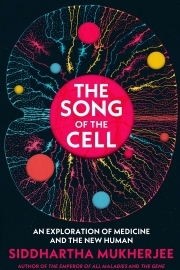The Song Of The Cell: An Exploration of Medicine And the New Human

Siddhartha Mukherjee
Vintage, £25.00
As biologists we may think we know, generally speaking, what cells are and what they do. Yet in The Song of the Cell Siddhartha Mukherjee manages to capture the wonder of these fundamental units of life and the myriad things they do. Cells are even more diverse than the species they form, and so at times the topic seems to sprawl out and out into all of life.
The book is driven by the story of how we found out what cells are and what they do. Mukherjee’s history of the major discoveries in cell biology is excellent and engaging, highlighting the famous contributions of great minds such as Robert Hooke, but also the many digressions, happy mistakes and disagreements that add up to scientific progress.
The many functions of cells are explained through more stories of discovery, observation and serendipity. For a book aimed at a general audience, some of the passages will be too simplistic or obvious to biologists who may have studied such things for years or even decades. Nevertheless, Mukherjee’s writing is full of wonderfully vivid details and creative metaphors. He helps the reader to visualise these invisible intracellular happenings by inviting us to imagine we are miniature explorers, swimming through certain parts of the cell or landing on its surface. As an oncologist and winner of a Pulitzer Prize for his book on cancer, The Emperor of All Maladies, his writing on how cells can go wrong is particularly illuminating.
As the book progresses, the cells the author is describing grow too, from single cells to colonies and eventually complex multicellular organisms, people, cancer patients and ecosystems. Returning to the idea of how well we understand cells, Mukherjee admits that, despite amazing recent progress in areas such as cancer, proteinomics and gene-editing, there is still lots to learn.
Dr Ahmed Mohamed


